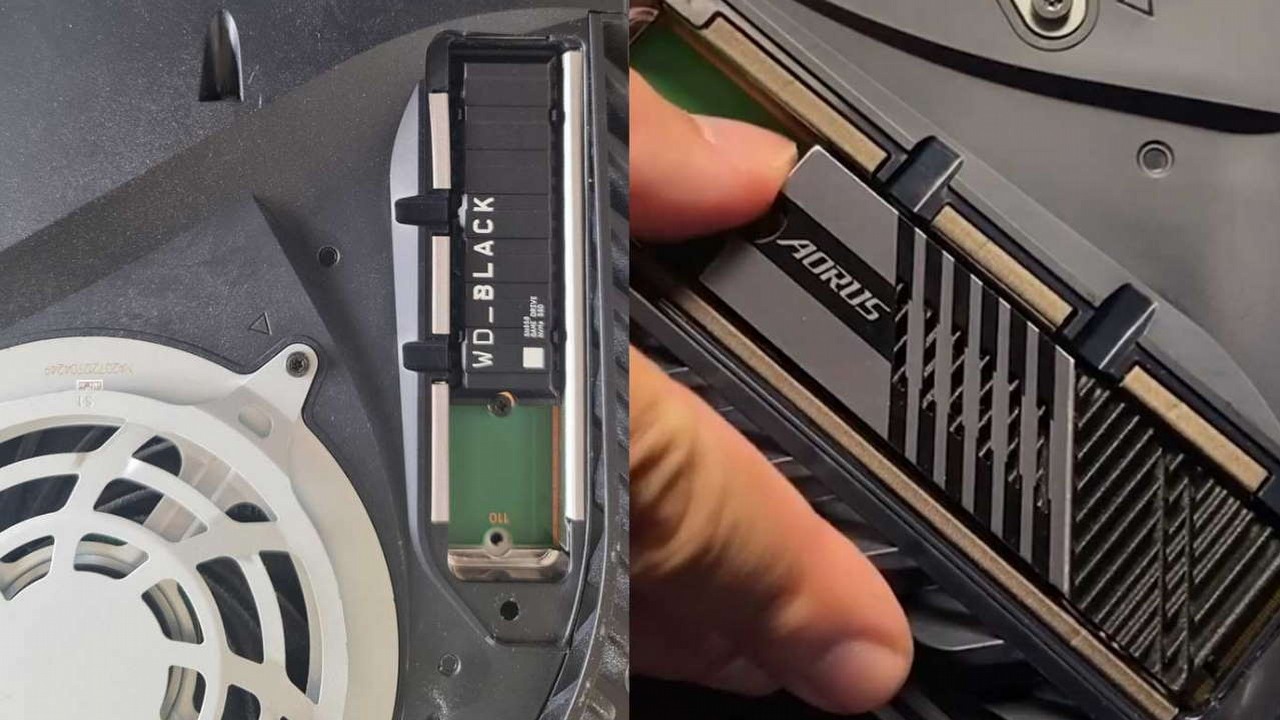SSDs Tested in PS5; No Major Differences in Performance Found
Digital Foundry tested the performance of SSDs in PlayStation 5 in PS4 and PS5 games, as well as transferring data between the internal and test drives.
2

- The PS5 software beta adds support for NVMe SSDs;
- The Digital Foundry crew decided to test the new feature on a Samsung 980 Pro.
Digital Foundry's team took a look at the NVMe SSD whose support has been added in the latest PS5 firmware beta. The editors looked at how the drive performs in games, how it compares to Sony's built-in solution, and how long it takes to transfer data between the two.
Samsung 980 Pro 500 GB drive participated in the tests, with performance tested both in the factory version without a heatsink and with cooling installed. The device offers a transfer rate of 6500 MB/s, which meets Sony's minimum requirements - 5500 MB/s. The results are not surprising, at least when it comes to loading games.
Games tested on PS4 included The Witcher 3: Wild Hunt, Cyberpunk 2077, Fallout 4, Final Fantasy XV and Battlefield 5, with the following results (times in seconds):
Game title / location | PS5's Stock Internal Drive 825GB | Samsung 980 Pro 500GB | Samsung 980 Pro 500GB/Heatsink |
The Witcher 3: Novigrad Centre | 48,01 | 45,07 | 44,67 |
The Witcher 3: White Orchard | 22,88 | 22,88 | 22,70 |
Cyberpunk 2077: Ripperdoc | 41,12 | 43,93 | 38,40 |
Cyberpunk 2077: Maelstromers HQ | 33,08 | 31,08 | 31,12 |
Fallout 4: Commonwealth | 16,50 | 14,87 | 15,13 |
Fallout 4: Diamond City | 15,27 | 14,01 | 14,17 |
Final Fantasy 15: Lestallum | 29,18 | 27,43 | 27,60 |
Final Fantasy 15: Hammerhead | 24,57 | 24,08 | 23,87 |
Battlefield 5: Nordlys | 31,50 | 34,57 | 34,57 |
Battlefield 5: Tirailleur | 31,58 | 34,63 | 34,53 |
As you can see in the above summary, in most tests Samsung 980 Pro performs slightly better than PS5's stock internal solution. Although these are minimal differences, which for most will be unnoticeable. The same goes for games developed for PlayStation 5. Digital Foundry tested A Plague Tale: Innocence and Star Wars Jedi: Fallen Order.
Game title / location | PS5's Stock Internal Drive 825GB | Samsung 980 Pro 500GB | Samsung 980 Pro 500GB/Heatsink |
A Plague Tale Innocence: Mission 1 | 15,13 | 14,95 | 14,92 |
A Plague Tale Innocence: Mission 2 | 16,92 | 16,48 | 16,53 |
Star Wars Jedi Fallen Order: Kashyyyk | 16,43 | 16,43 | 16,45 |
Star Wars Jedi Fallen Order: Bracca | 15,30 | 15,30 | 15,35 |
The biggest difference can be seen when copying data between the drives. For testing the team used Cyberpunk 2077 which, after installing the latest update, occupies 101GB. Transferring the game from the internal drive to Samsung SSD took 1 minute and 11 seconds. For comparison, the same operation on external media took - 6:15 for Samsung 870 QVO and 16:24 for Seagate 5TB. Copying from the Samsung drive to PS5 memory took 7 minutes and 18 seconds. For the external SSD, it took 13 minutes and 37 seconds.
As you can see, we gain the most when copying games from PS5's stock internal drive to the installed SSD. For games, the differences are negligible. Of course, as long as we use a drive that meets the minimum requirements outlined by Sony. With slower solutions the situation may be different.
- Spring 2026 will be hot. Saros will be released a little later, but with a bang, and Returnal fans will be delighted
- After nearly 30 years, Ghost of Yotei's devs must start a new chapter. Brian Fleming's days at Sucker Punch are numbered
- End of remote work and 60 hours a week. Demo of Naughty Dog's new game was born amid a crunch atmosphere
2

Author: Paul Musiolik
Started writing about games on the SquareZone website. Later, he wrote and managed the non-existent PSSite.com, and currently runs his own blog about games. He hasn't yet written a text that he would be 100% satisfied with. He started his adventure with games at the age of 3, when he managed to convince his father to buy a C64 computer. The love for electronic entertainment awakened by Flimbo's Quest blossomed during the first adventures with Heroes of Might & Magic, reaching its peak after purchasing the first PlayStation. As he grew older, he had more encounters with Nintendo portable consoles, and also returned to the PC as an additional gaming platform. He collects games and is a fan of emulation.
Latest News
- Elite Mod lets you play the Tau faction in Warhammer 40K: Dawn of War 2
- Huge Marvel Adventures mod now with new superheroes, including Sentry
- Butcher's Summit, an impressive free diselpunk FPS, has been released
- Free FPS on Half Life engine gets big update
- On February 3, gaming history could change forever. Red Dead Redemption 2 one step away from a major achievement

